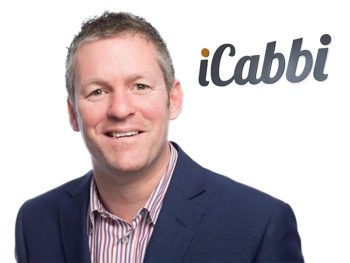Interview: Gavan Walsh, founder & CEO, iCabbi
iCabbi might not be a household name like Uber, but that’s because it’s a cloud based dispatch system for the taxi and private hire community that’s firmly rooted in B2B. The system uses artificial intelligence to manage customer bookings, while integrating online bookings and payments to offer taxi fleets the chance to become more efficient, expand and provide a better service to customers. Jonathan Musk talks to Gavan Walsh, founder and CEO of the Dublin-based company, that this year broke new ground after processing more than 300 million bookings across the UK, US and Canada, as well as making headlines in June after Renault’s RCI Bank and Services bought a 75% stake in the company.
What is iCabbi?
iCabbi’s cloud-based taxi dispatch system powers over 75,000 vehicles in over 90 cities in the UK & Ireland, USA, Canada and Finland. We’ve successfully completed over 300 million trips since setting up in Dublin in 2010.
We’re passionate about the taxi industry and believe that taxi companies will play a central role in the future of mobility.
What’s different about iCabbi?
Many of our customers say that the flexibility of the system was a big factor in them choosing us. No two customers use the system in the same way. It can be set-up specifically for your needs. Our recent investment from RCI makes iCabbi the only dispatch provider in this sector that is fully funded. We now have backing from a partner of a major player with a mutual interest in Taxi evolving again and succeeding. We are also fully cloud-based so our customers can operate from anywhere at any time with an automation rate regularly exceeding 70%. This ensured that passengers have a more consistent and seamless experience.
We provide a full product suite including driver app, passenger app, and dispatch system. But we also support a range of integrations with our API, which gives our customers the freedom to choose from different add-on products – which is something else that sets us apart from competitors. All of this helps to reduce overheads. And better still, drivers like it. The thing about happy drivers is that they multiply – it’s how you grow your fleet.
How does iCabbi differ from services like Uber?
Quite a lot! It really comes down to who the customer is. iCabbi is a dispatch platform for taxi companies. We’re B2B – looking after professional fleets. Uber is a platform that connects passengers and drivers in a similar way to how Airbnb connects guests and hosts. Much like an Airbnb host, anyone can be an Uber driver. The passenger, therefore, makes the trade-off between low-prices and regulation.
Although Uber is global in scale, it is made up of independent individuals. Our customers, though fewer in numbers, all represent large and highly organised fleets of vehicles, with professional and usually full-time drivers. There’s a significant opportunity for these enterprise operations to take a strong foothold in the future of mobility in their regions.
Why should fleets know about iCabbi?
We’re an innovative, customer focused and forward thinking dispatch system. We don’t just provide what you need now, but do significant research and development into what you will need in the future to compete and grow. Our aim is to make taxi companies relevant in the new age of transport and we believe the opportunities are huge. We’re passionate about the taxi business and leading it to the next level.
Are there any significant case studies you can tell us about?
Whiteside Taxis, England’s oldest taxi company and based in Blackpool & Flyde, operates a fleet of 90 cars with 140 drivers, taking 10,000 bookings per week. The company adopted iCabbi to streamline the operation and offer more control. In a word, iCabbi offered automation to the company and resulted in £15,000 savings per year on the taxi firms phone bill, while simultaneously increasing bookings by 1,500 per week and consequently the company has grown its fleet.
iCabbi also helped Links Taxis in Grimsby that runs a 180-car fleet and takes 16,000 bookings per week, and Intercity Private Hire that operates a fleet of 170 cars and takes 14,870 bookings per week. Each chose iCabbi for its efficiency, cost savings and added flexibility that has in both cases aided bookings and increased growth.
Autonomous vehicles: do these fit in with iCabbi’s business model?
Autonomous vehicles are definitely coming – but not as soon as predicted. Think of what’s needed to take them mainstream. What’s exciting, however, is that the consumer trends away from private car-ownership anticipated to accompany the arrival of the driverless car are already well underway. As cities become smarter and smarter there will be more and more demand for hired rides. This increases the pie for professional fleets and iCabbi is helping our customers to take their share, and more. For now, we’re focused on empowering our customers through the continued development of our products and supporting a marketplace for open innovation.
Disruptive businesses can themselves be at risk of disruption. How does iCabbi intend to overcome this?
iCabbi doesn’t stay still long enough to be disrupted. Our promise to our customers is quality of product, sure – but really it’s more than that: We’re the guys who see change coming and adapt. We made a business out of transforming an industry once, and now we’re going to do it again. It’s the former disruptors like Uber and Lyft who are now on the cusp of being disrupted. The bigger you get, the harder it becomes to adapt quickly enough.













